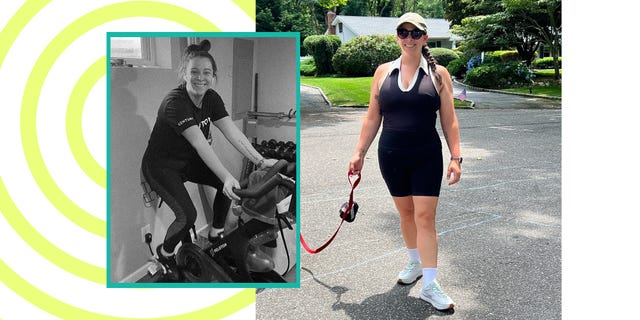
My relationship with food has never been healthy. I struggled with my weight my entire life, but my recent weight loss journey began after my second son was born in 2018.
I have dealt with major depressive disorder and postpartum depression since my he was born. In 2019, about a year later, I sought help. Over the course of two years, I was prescribed a variety of different medications for depression, like Zoloft, Celexa, and Cymbalta, until I decided on Cymbalta, which worked well for me. Many of the antidepressants I was prescribed have a potential side effect of weight gain.
In late 2021, I got on the scale and was the same weight that I was when I was nine months pregnant with my youngest—and it didn’t feel good. At the time, I attributed my weight gain to the antidepressants, but I continued to see my weight increase. So in November 2021, I started WeightWatchers.
Over the course of eighteen months, I devoted all of my time and energy into participating in the WW program and I lost 65 pounds. I connected with other WW members across the internet and shared recipes and information about nutrition on my Instagram and TikTok accounts. Everything was good until something in my personal life would happen, which would then cause me to spiral back into my old habits of emotional eating and binge eating. Binge eating is a condition that involves eating a large amount of food in a short period of time while feeling out of control, typically once a week, according to the National Institutes of Health (NIH).
My mental and physical health are so closely intertwined that if one succeeds, the other succeeds—and if one fails, the other fails.
Between February and December 2023, I battled my brain every day.
I was going through an emotional time in my personal life, and eating was my coping mechanism. I obsessed about food. If I was on a WW plan, I was thinking about all of the things that I wanted to eat. If I wasn’t on a diet plan, I would feel guilty. I had previously lost 65 pounds on WW, so why couldn’t I do the same thing now?
I was thinking about food constantly. But I learned that I’m not the only one to experience these thoughts. “Food noise” is a colloquial term for constant and persistent thoughts about foods and eating that are difficult to suppress, per a 2023 narrative review in the journal Nutrients. It may also feel like your life constantly revolves around food, per the review. This is exactly what was happening to me.
When I lost weight on WW, I devoted all of my time to the program and I was successful. It was when life got hard that the food noise returned.
At the end of 2023, I had gained 37 pounds.
So, my doctor and I decided to try Zepbound (tirzepatide), a weight loss and weight management injection, in addition to WeightWatchers.
I had previously done some research about how weight loss medications like Zepbound can help “quiet” food noise. This caught my attention and sparked my initial interest in taking it. And although mental health was not the main reason that I started Zepbound, mine improved so drastically while on it that after talking with my psychiatrist, I was eventually able to lower my dose of the antidepressant.
At the time, WW had also launched the WeightWatchers Clinic, an online program that connects you with clinicians and care coordinators to help tailor your weight loss plan and prescribe weight loss meds. I chose to try WeightWatchers Clinic because I was already happy and comfortable with the WeightWatchers experience, so it made the most sense to explore this option through them.
I got my prescription for Zepbound through WeightWatchers Clinic, and I started with the loading dose of 2.5 mg of Zepbound. I stayed at that dose for about a month to make sure that my body didn’t have any negative side effects, like nausea or vomiting. While taking the medication that first month, I communicated with my WW care coordinator and clinician via chat to log any concerns or side effects. Once we knew I wasn’t having any negative side effects from Zepbound, my doctor increased my dose to 5 mg for about a month, and then eventually to 7.5 mg.
At the beginning when my body was acclimating to the med, I experienced mild constipation that righted itself after a few weeks. But overall, I was lucky and had very minimal side effects. On the days I’d do my injection, I noticed that I wasn’t as interested in eating food. (But I still ate, because it’s not healthy to starve yourself!).
At that point, my diet changed as well. WeightWatchers introduced their GLP-1 Program, which connects you with a clinician to decide your best medical weight loss options, including GLP-1 medications. Rather than track points (the traditional WW program uses a point system to help you track food and encourage healthy choices), the GLP-1 plan had me strive for certain target amounts of protein, water, fruits, and vegetables for the day. An important piece of being on Zepbound was making sure that I was getting enough protein because you are prone to lose muscle mass when taking GLP-1 medications, and eating enough protein can help. The tracker helped me understand how much protein I was getting in my diet and whether or not I was on track toward my long-term weight loss goals.
I lost 22 pounds on Zepbound from mid-December to the end of March.
The mental health changes I experienced during my weight loss journey meant so much more to me than losing weight. For me, the weight loss was simply an added bonus.
Zepbound did more noticeable things for my mental health than any SSRI that I have ever taken. (GLP-1s including Zepbound have been studied to decrease risk of depression and anxiety.) For the first time in my life, my brain was quiet. I didn’t realize how much mental space was being taken over by food noise until it was gone.
“GLP-1 medications impact all of the neurotransmitters in the brain associated with mental health—norepinephrine, serotonin, and dopamine,” says Sue Decotiis, MD, a weight loss doctor based in New York City. “When they’re low, it causes depression and anxiety. GLP-1s raise the production and action of these neurotransmitters.” That said, none of these medications are FDA-approved for mental health, she says.
In addition to my mental health changes, I realized that the food noise I previously struggled with had dissipated. I could eat a serving of cake, be satisfied, and move on with my day. I could have leftover dessert on the counter and not fixate on it. I was able to take on so much more with the space my brain now had—I even started different puzzles and projects I previously didn’t have the energy for. This was so incredibly freeing.
But in 2024, after four months on Zepbound, I was forced to stop taking it.
The main reason I decided to go off of Zepbound was cost. I had been paying $550 per month out-of-pocket with a savings card, and my insurance refused to cover it. I thought that if I spoke to my insurance company and went through the right channels, I would be able to secure coverage eventually. I pleaded with them, explaining that this medication was beneficial for my mental health, but they would not budge. The rule for my insurance company was, these medications would only be covered for patients who are diabetic—and because I didn’t have a BMI over 30 and diabetes, I didn’t qualify.
Because insurance wouldn’t cover the medication, I had to pay for the drug out of pocket. My cost for Zepbound is $1,100 per month, and even with a savings card from the drug company, it only went down to $550 per month. At first, I decided that I would still try to stay on it, cost be damned.
Unfortunately, the cost was just not feasible for me to maintain long-term. Six thousand dollars or more per year is a lot. I kept thinking about what I could use that money for, like my kids, vacations, and bills. I couldn’t put myself in debt.
Another major issue at the time was drug shortages. It was difficult to get the dosages that I needed, and going to the pharmacy to figure things out made me anxious. (My doctor would send over the prescription, but I was lucky if I could actually get it.)
Due to the high cost, I stopped taking the medication cold turkey.
I didn’t have any adverse physical side effects after stopping, but the food noise came back immediately.
When I came off Zepbound in March 2024, I did so with a plan in mind. I learned through the WeightWatchers Clinic that some oral medications, like Contrave (a combination of Bupropion and Naltrexone), can help with certain aspects of addictive behaviors and cravings. When the food noise came back, I figured that I had nothing to lose by giving Contrave a try. It was easily accessible, covered by my insurance, and relatively inexpensive. I also met with a dietitian to discuss where I was, where I wanted to go, and how I could get there. We decided that going back to the WeightWatchers behavioral plan was the best route for me. It was something that I was comfortable with and had already had success with from 2021-2023.
Since then, I have been on Contrave and use the WeightWatchers points plan to track. I have lost more weight—a total of 55 pounds. Now, I have to be super mindful of what I’m eating and make sure that I am tracking what I consume. And while I do believe that Contrave does help with some of my cravings, it is not nearly as helpful as the Zepbound was.
I also have a food journal in the notes app on my phone. This forces me to stop and think about what I’m feeling and why I’m feeling it.
Unfortunately, it wasn’t my choice to go off of Zepbound. I was completely priced out of a medication that literally changed my life. Sometimes, I get frustrated knowing how hard I have to work to stay on a WW eating plan and control my binge eating knowing that Zepbound made it much easier for me to simply coexist with food.
There is so much stigma out there surrounding weight loss medication that when I decided to take Zepbound, I was nervous to tell family, friends, and even the WW community because I feared being judged. When someone is depressed, you can tell them to go to a doctor or get medication. Why is this any different?




